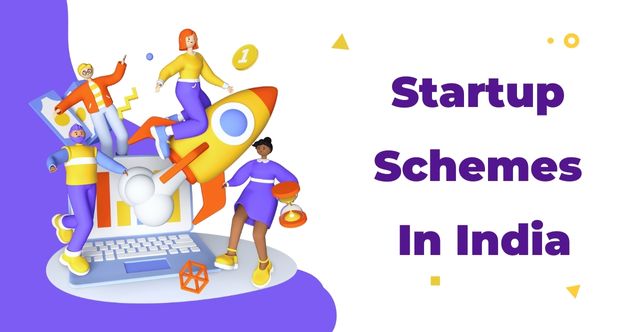Are you passionate about starting your own business? Do you wish there was a way for you to get access to the funds, mentorship, and resources you need to succeed? Fund for Startup India is a flagship initiative of the Government of India with the agenda to support startups and entrepreneurs in the country actively.
The main objective of the government program is to create a robust ecosystem that nurtures and protects innovation, entrepreneurs and startups in India and tries to generate large-scale employment opportunities and lead to the sustainable economic growth of the country.
The Indian government initiative came up with the Aatmanirbhar Bharat mission and the ‘Make in India’ program under which they launched various schemes, with the aim of transforming India into a global business hub.
In India, there are hundreds of government schemes covering every aspect of creating and maintaining a successful business. These are designed to attract new entrepreneurs and help existing ones stay afloat. Whether you’re starting out of college or looking for ways to grow an established company, these programs could be the key to success.
Today, India is the third-largest startup ecosystem worldwide. The country has over 100 unicorns and more than 60,000 startups operating within the country. This success can be partly attributed to the active support provided by the Indian government to startups and entrepreneurs through its various schemes and programs.
The success of small businesses is vital for economic stability and growth. The Government of India has launched several programs and schemes in the past few years that are customized for entrepreneurs and startups. These plans provide funding and other resources such as subsidies, grants, training, incubation centres, mentorships etc.
Here's a list of some of the most beneficial startup schemes in India for aspiring entrepreneurs.
12 startup schemes in India - A list of government programs
1) The Venture Capital Assistance Scheme
Ministry of Agriculture and Farmers Welfare
Venture Capital Assistance is financial support in the form of an interest-free loan provided by the Small Farmers Agribusiness Consortium (SFAC) to qualifying projects to meet the short-in capital requirement for the implementation of the project.
Benefits:
Help in assisting agripreneurs to make investments in setting up agribusiness projects
Provides financial support for preparing bank Detailed Project Reports (DPRs) through the Project Development Facility (PDF).
Eligibility:
- Farmers
- Producer Groups
- Partnership/Proprietary Firms
- Self Help Groups
- Companies
- Agripreneurs
- Units in Agri export zones
- Agriculture graduates Individually or in groups for setting up agribusiness projects.
2) Support for International Patent Protection in Electronics and & Information Technology (SIP-EIT)
Ministry Of Electronics & Information Technology
SIP-EIT is a scheme to offer financial support to (MSMEs) Ministry of Micro, Small & Medium Enterprises and Technology Startup units for international patent filing to encourage innovation and recognize the value and capabilities of global IP along with capturing growth opportunities in Information and Communication Technology in Education (ICTE) sector.
Benefits :
Eligibility:
Above 18 years old anyone can apply.
3) Startup India Seed Fund Scheme
The Startup India Seed Fund Scheme aims to offer financial assistance to startups for proof of concept, prototype development, product trials, market entry and commercialisation.
On February 5, 2021, the Government of India made an official announcement about the approval of the scheme. It has been approved for a period of four years and was implemented on April 1, 2021.
>> How to apply for startup India seed fund.
Startup India Seed Fund Scheme (SISFS) gives financial assistance to startups for proof of concept, prototype development, product trials, market-entry, and commercialization.
Eligibility:
Eligible startups can apply for the scheme on the Startup India portal.
4) MUDRA Yojana
Launched in 2015, MUDRA Yojana comes under Pradhan Mantri Mudra Yojana (PMMY), a loan scheme provided by banks for individuals, startups, and business owners, across India.
Under this scheme, a loan amount of up to Rs. 10 lakh is for those who want to start their own business or expand the existing business. The loan amount comes under three categories named Shishu, Kishor, and Tarun.
Benefits:
Apex Refinancer.
MUDRA Architecture Indigenously Conceived for the Indian context.
Inclusion of Last Mile Financiers - a game-changing idea.
Help expand Access to finance for micro-enterprises.
Lower Cost of Finance.
Credit Plus Approach.
Mass Entrepreneurship Development and Growth.
Eligibility:
Any Indian Citizen, who is eligible to avail of a loan and has a business plan for income-generating activity,
5) Qualcomm Semiconductor Mentorship Program (QSMP)
Qualcomm, the mobile chipset manufacturing company, has partnered with the Centre for Development of Advanced Computing (C-DAC) to conduct the Qualcomm Semiconductor Mentorship Program (QSMP) in 2022 for startups that are working in the Indian semiconductor space sectors.
Benefits:
Gives you the opportunity to connect with C-DAC, ISM ( MeitY), DPIIT, Invest India, and other government agencies.
Eligibility:
Qualcomm Semiconductor mentorship Program is a first-of-its-kind initiative for semiconductor startups in India.
6) Digital India Bhashini Scheme - Government Scheme of India
Digital India Bhashini was an initiative that Prime Minister Narendra Modi launched along with a slew of other initiatives like Digital India GENESIS and Indiastack.global, to boost Indian startups, and to provide funds for startups in India as he declared Digital
India week 2022 in Gandhinagar on July 4, 2022.
The scheme aims to help startups and entrepreneurs with easy access to the internet and digital services in vernacular languages.
Benefits:
It will empower Indian citizens by connecting them to the Digital Initiatives of the country in their own language, thereby leading to digital inclusion and encouraging startups' participation.
Eligibility:
Eligible for every citizen of India.
7) Digital India GENESIS
Digital India GENESIS is a scheme that Prime minister Narendra Modi launched on July 4, 2022. The "GENESIS" in the scheme helps "Gen-next Support for Innovative Startups". This will empower national deep-tech startups. The total budget of this programme is disclosed, which is around Rs 750 crore.
Benefits:
Around 12000 post office branches in rural areas have been linked electronically. The Make in India initiative has offered the electronic manufacturing sector in India. The Digital India plan could boost GDP.
Eligibility:
Its focus is to offer a one-stop search and discovery portal where users can find schemes that they are eligible for.
8) India Water Pitch-Pilot-Scale Startup Challenge
The government of India launched a startup challenge on March 12, 2022, which was declared by Union Minister Hardeep Singh Puri, where selected startups of India will get a grant of Rs 20 lakhs along with support and mentorship from the Ministry Of Housing And Urban Affairs, participate in this startup challenge, which aims to empower as many as 100 startups in the water sector.
This scheme comes under Atal Mission for Rejuvenation and Urban Transformation (AMRUT) 2.0, Minister Puri declared that this initiative will help the water sector startups and lead them towards growth "through innovation and design that will drive sustainable economic growth and generate employment opportunities in the country."
Benefits:
The 100 final chosen start-ups in the India Water Pitch-Pilot-Scale Start-up Challenge will be given a grant amounting to a maximum of Rs. 20 lakhs, in three tranches of Rs. 5 lakh and Rs. 7 lakh.
Eligibility:
All entities are recognised as start-ups by the Department of Promotion of Industry and Internal Trade (DPIIT).
Start-ups must provide solutions in the above-mentioned thematic areas.
9) Dairy Processing and Infrastructure Development Fund (DIDF)
This scheme comes under the agriculture ministry Narendra Singh Tomar was allocated a total amount of Rs 1.31 lakh crore in the 2021 Budget, which has been increased to Rs 1.32 lakh crore in the Union Budget 2022.
A fund consisting of blended capital that will be raised under the co-investment model will be facilitated through NABARD, which will finance the agritech startups and rural enterprises that are relevant to farming sectors and the Finance Minister of India.
Nirmala Sitharaman further added that the use of ‘Kisan drones’ will see a new encouragement to farming sectors, facilitate effective crop assessment, digitization of land records, and the spraying of insecticides and nutrients required in farming.
Benefits:
The Scheme envisages providing loan assistance to State Dairy Federations, District Milk Unions, Milk Producers Companies, Multi-State Cooperatives and NDDB subsidiaries across the country who are termed Eligible End Borrowers (EEBs).
Eligibility:
The scheme is available for Milk Unions, State Dairy Federations, Multi-state Milk Cooperatives, Milk Producer Companies and NDDB subsidiaries.
10) Loan For Rooftop Solar Pv Power Projects
To build reliance on non-conventional sources of power, the government of India has decided to set up 40,000 MWp of Grid-Interactive Rooftop Solar PV Plants in the coming five years.
These rooftop solar PV plants will be set up in residential, commercial, industrial, and institutional sectors in India and shall range from 1 kWp to 500 kWp in terms of capacity only.
Such rooftop plants are economically viable since they can produce electricity using solar energy at about INR 7 per kWh without any subsidy requirements. The government also offers a subsidy of 15% on these plants to the associations or individual companies, making the scheme even more lucrative.
Benefits:
It is cheaper than the conventional electric supply and government subsidies also help bring the cost down.
Low maintenance charges are most rooftop solar systems have a life expectancy of up to 25 years and need only basic maintenance such as regular cleaning and repairs.
Eligibility:
Solar Loan eligibility criteria for salaried, and individuals.
11) Modified Special Incentive Package Scheme (M-SIPS)
The government of India has approved a special incentive package to boost large-scale manufacturing in the Electronic System Design and Manufacturing (ESDM) industry.
Under M-SIPS, the Indian government will offer a subsidy of 20% on capital investments in special economic zones (SEZs) and 25% on capital investments in non-SEZs for the individual firm. It also offers the reimbursement of CVD/excise on capital equipment for non-SEZ units. Reimbursement of central taxes and duties is also offered for high technology and high capital investment units.
Benefit:
M-SIPS offers a subsidy to invest in the expenditure of electronic goods manufacturing.
Eligibility:
The applicant is eligible to avail of this scheme if the investment ranges between one crore and 5000 crores based on the type of project.
12) Samridh program
The Government of India has launched the MeitY SAMRIDH Scheme and its main objective of the scheme is to provide funding support to startups so that they can become successful. Through this scheme, not only funding support but also skill sets will be offered to the entrepreneurs.
Benefits:
The SAMRIDH scheme will provide support to selected Accelerators for extending Accelerator Services as defined below to startups and even provide the first round of funding of up to ₹40 lakh (with an average of ₹ 30 Lakh per startup per cohort).
Eligibility:
To start a startup, it is mandatory for the entrepreneurs to be from the country of India.
13) Aspire
A Scheme for the promotion of Innovation, creativity, rural industries and entrepreneurship by the government of India and the Ministry of MSME
It was launched to set up a network of technology centres and to set up incubation centres to accelerate entrepreneurship and also to promote startups for innovation, and creativity in the agro-industry.
How to apply:
The application can be sent to the Aspire Scheme Steering Committee of the Ministry of MSME. The Scheme Steering Committee will be responsible for complete policy, coordination, and management support. The Council will be chaired by the Secretary of the Ministry of MSME. And anyone above 18 can apply for the scheme.
Benefits:
Create new jobs and reduce unemployment.
Promote entrepreneurship culture in India.
Grassroots economic development at the district level.
Facilitate innovative business solutions for un-met social needs.
Eligibility:
The applicant has to be more than 18 years old with nationality being an Indian resident.
14. Digital India BHASHINI
‘Digital India BHASHINI’ seeks to enable easy access to the internet and digital services in Indian languages, which includes voice-based access and helps the creation of content in Indian languages. It was started by Prime Minister Narendra Modi at the inauguration of Digital India Week 1 2022 at Gandhinagar, Gujarat.
Digital India BHASHINI, as India’s Artificial Intelligence (AI)-led language translation platform, will enable vast citizen engagement to build multilingual datasets through a crowd-sourcing initiative called Bhasha Daan.
Benefits:
It will empower Indian citizens by connecting them to the Digital Initiatives of the country in their own language leading to digital inclusion.
It will also encourage the participation of startups.
Eligibility:
It is for every Indian citizen.
15. Atal Innovation Mission (AIM)
Atal Innovation Mission (AIM), NITI Aayog is the Government of India’s flagship initiative to boost a culture of innovation and entrepreneurship in India and was started in 2016.
Towards this end, AIM has taken a holistic approach to ensure the creation of a problem-solving innovative mindset in schools and creating an ecosystem of entrepreneurship in universities, research institutions, and private and MSME sectors.
Today, all AIM initiatives are monitored and managed systematically using real-time MIS systems and dynamic dashboards. AIM is also presently having its programs reviewed by third-party agencies to ensure continuous improvements; this scheme is available for students from grades 6 to 10.
Benefits:
AIM's objective is to develop new programmes and policies for fostering innovation in different sectors of the economy, offering platforms and collaboration opportunities for different stakeholders, and developing an umbrella structure to oversee the innovation & entrepreneurship ecosystem of the country.
Eligibility:
Eligible Non-Academic applicants
Summary
The Indian government promotes these schemes to help the present group of startups benefit from them but also motivating the entrepreneurs, startups, and youth from all domains, who tend to be independent, and strong in the world market and lead the vision of Atmanirbhar Bharat.
These initiatives have been introduced for the development of the Indian startup ecosystem in the country.
FAQ's:
Individuals applying for this scheme must be over the age of 18 years.
Under CLCSS, the government offer a 15% subsidy for investment up to Rs 1 crore for upgrading technology for startups and MSMEs in India.
Beti Bachao Beti Padhao.
Sukanya Samriddhi Yojana.
Balika Samridhi Yojana.
Mukhyamantri Rajshri Yojana.
Mukhyamantri Laadli Yojana.




